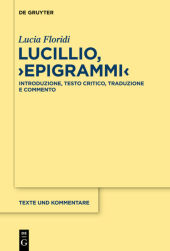 Neuerscheinungen 2014Stand: 2020-02-01 |
Schnellsuche
ISBN/Stichwort/Autor
|
Herderstraße 10
10625 Berlin
Tel.: 030 315 714 16
Fax 030 315 714 14
info@buchspektrum.de |

Lucia Floridi
Lucillio, "Epigrammi"
Introduzione, testo critico, traduzione e commento
2014. X, 662 S. 230 mm
Verlag/Jahr: DE GRUYTER 2014
ISBN: 3-11-033616-2 (3110336162)
Neue ISBN: 978-3-11-033616-0 (9783110336160)
Preis und Lieferzeit: Bitte klicken
In der Reihe werden wichtige Neuausgaben und Kommentare zu Texten der griechisch-römischen Antike publiziert, insbesondere kommentierte Ausgaben nur fragmentarisch überlieferter Texte. Ihrem umfassenden Charakter entsprechend leistet die Reihe einen wesentlichen Beitrag zur Erschließung der antiken Literatur.
"Floridi provides an excellent tool for scholars who wish to learn more about Lucillius and about humour in general in antiquity, as well as about e.g. athletics and social categories. This volume provides a much needed foundation on Lucillius, and leads the way for further research on the author and on the skoptic genre."Cosetta Cadau in: Mnemosyne 1/2016
The series publishes important new editions of and commentaries on texts from Greco-Roman antiquity, especially annotated editions of texts surviving only in fragments. Due to its programmatically wide range the series provides an essential basis for the study of ancient literature.
This is the first modern commentary devoted exclusively to the epigrams of Lucillius, a prolific Neronian poet who, in spite of being one of the most significant representatives of the Greek satirical epigram, has primarily been studied not for his own value, but for the influence he had on Martial. About 140 epigrams of his survive, mostly in book XI of the Anthology. The volume contains an extensive introduction, a new critical text and translation, and a full literary and philological commentary. While the body of the commentary focuses on the particular, providing literary readings of individual epigrams and a line-by-line linguistic, philological, and stylistic analysis, the introduction deals with Lucillius´s identity, the tradition of the text, style, themes, metrics, and cultural setting, and additionally investigates the origins and development of Greek skoptic epigram. Particular attention is paid to the way in which Lucillius engages with the conventions of the genre, often overturning the reader´s expectations. In this way, the work explores the paradox inherent to the fact that a poetic form that was by its nature eulogistic (inscriptional epigrams were born in order to record, and thus celebrate, the dedication of an object or the death of a man) ultimately became the genre of mockery and abuse.


